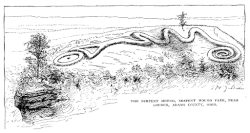| Periods in North American prehistory |
|---|
 |
In the classification of the archaeology of the Americas, the Post-Classic Stage is a term applied to some Precolumbian cultures, typically ending with local contact with Europeans. This stage is the fifth of five archaeological stages posited by Gordon Willey and Philip Phillips' 1958 book Method and Theory in American Archaeology.[1]
- The Lithic stage
- The Archaic stage
- The Formative stage
- The Classic stage
- The Post-Classic stage
Cultures of the Post-Classic Stage are defined distinctly by possessing developed metallurgy. Social organization is supposed to involve complex urbanism and militarism. Ideologically, Post-Classic cultures are described as showing a tendency towards the secularization of society.[2]
Postclassic Mesoamerica runs from about 900 to 1519 AD, and includes the following cultures: Aztec, Tarascans, Mixtec, Totonac, Pipil, Itzá, Kowoj, K'iche', Kaqchikel, Poqomam, Mam.
In the North American chronology, the "Post-Classic Stage" followed the Classic stage in certain areas, and typically dates from around AD 1200 to modern times.[3]
YouTube Encyclopedic
-
1/4Views:5001 3363 289672
-
U.S. History to 1877: Post Classic Period
-
Historians and the Anthropocene by John McNeill & Julia Adeney Thomas
-
Cyena-Ntu: Ancient Kemet and the Bantu Worldview (ASCAC)
-
260 Days Calendar
Transcription
See also
References
- ^ Willey, Gordon R. (1989). "Gordon Willey". In Glyn Edmund Daniel; Christopher Chippindale (eds.). The Pastmasters: Eleven Modern Pioneers of Archaeology: V. Gordon Childe, Stuart Piggott, Charles Phillips, Christopher Hawkes, Seton Lloyd, Robert J. Braidwood, Gordon R. Willey, C.J. Becker, Sigfried J. De Laet, J. Desmond Clark, D.J. Mulvaney. New York: Thames & Hudson. ISBN 0-500-05051-1. OCLC 19750309.
- ^ Gordon R. Willey and Philip Phillips (1957). Method and Theory in American Archaeology. University of Chicago Press. ISBN 978-0-226-89888-9.
- ^ "Method and Theory in American Archaeology". Gordon Willey and Philip Phillips. University of Chicago. 1958. Archived from the original on 2012-06-28.[ISBN missing]



